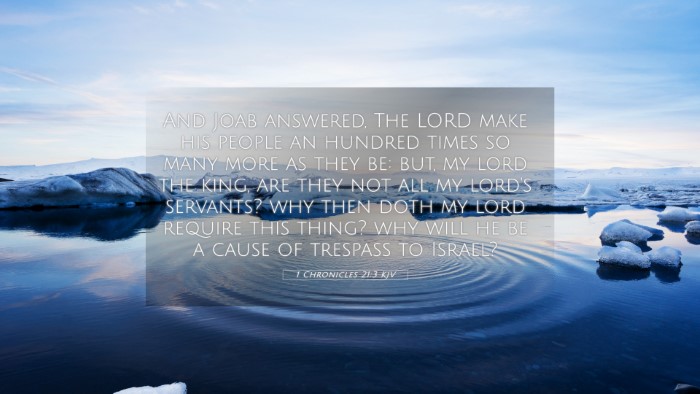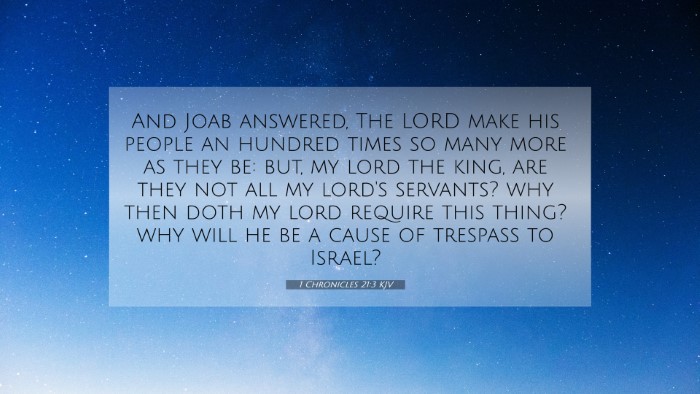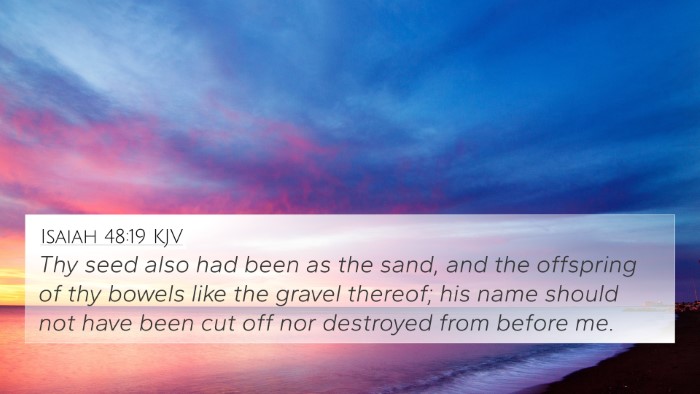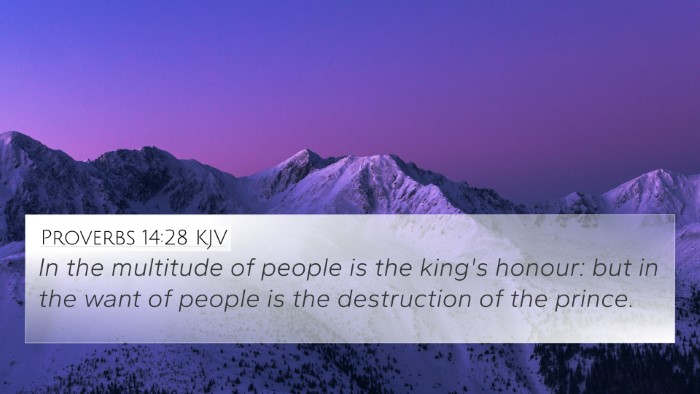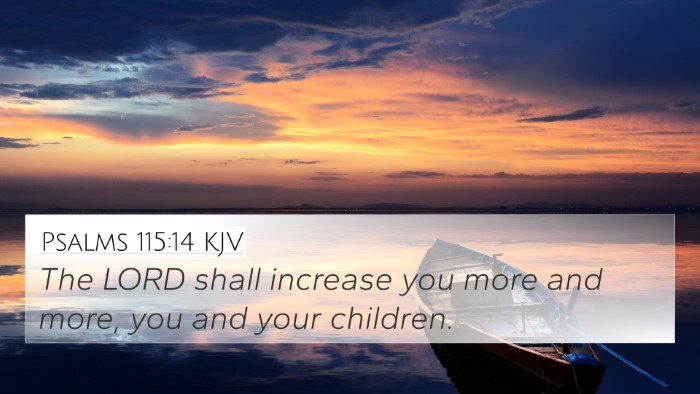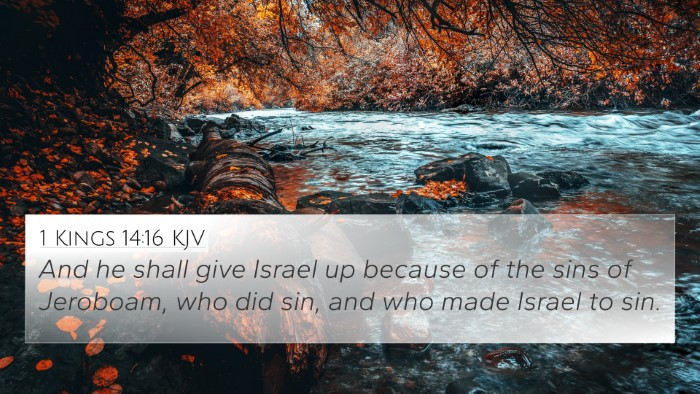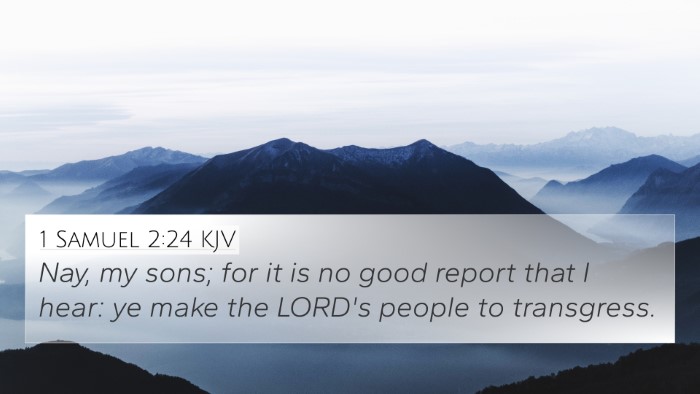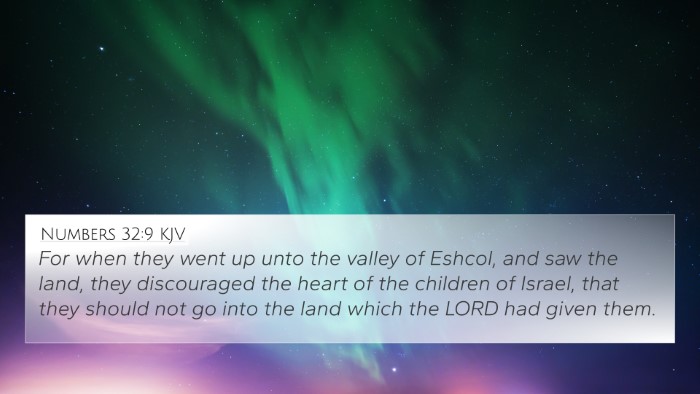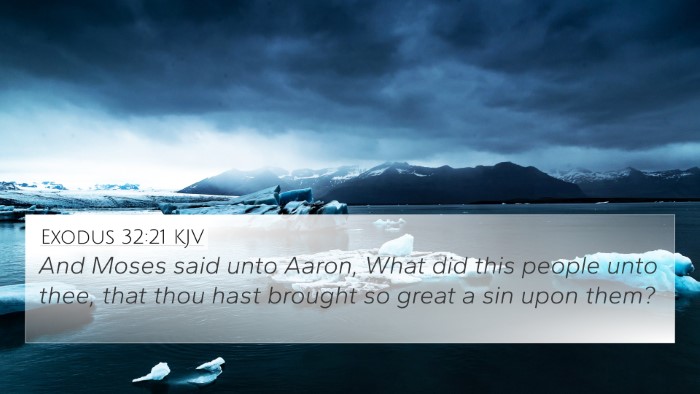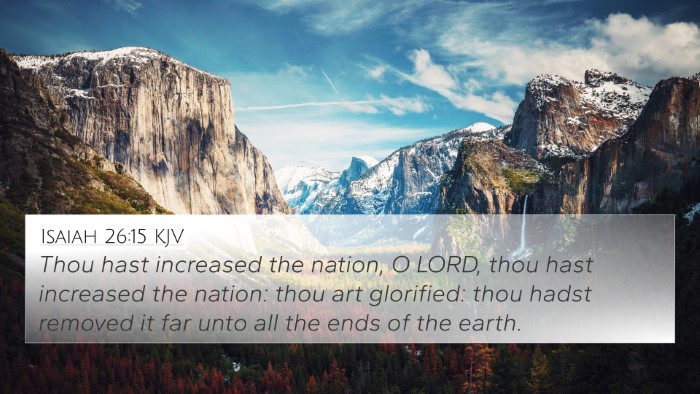Understanding 1 Chronicles 21:3
The verse 1 Chronicles 21:3 states:
"And Joab answered, The Lord make his people a hundred times so many more as they be: but, my lord the king, are they not all my lord's servants? why then doth my lord require this thing? why will he be a cause of trespass to Israel?"
This verse highlights a significant dialogue between King David and his commander Joab regarding a census that David wishes to conduct. Understanding this verse requires careful examination of the text and the broader Biblical themes it reflects. Below are insights from several public domain commentaries, providing a comprehensive explanation and thematic connections.
Commentary Insights
Matthew Henry's Commentary
Matthew Henry observes that Joab shows both respect and concern for King David's command. He expresses a reluctance to take a census, reminding the king that all the people are the king's servants. Henry notes that Joab's response reflects an awareness of the potential consequences of such an action—suggesting that it could lead to a trespass against God. Joab's warning highlights the theological implications of relying on human numbers rather than trusting in God’s provision.
Albert Barnes' Notes
Albert Barnes elaborates on Joab's hesitance, indicating that he is aware that counting the people might incite God’s wrath, recalling instances in Israel’s history where similar actions brought judgment. Barnes emphasizes that Joab’s dialogue illustrates a vital connection between obedience to God and leadership responsibilities. This commentary illustrates how Joab is positioned as a voice of reason amidst the king’s desires and potential missteps.
Adam Clarke's Commentary
Adam Clarke underscores Joab’s deep-seated loyalty to David, yet he vividly warns against numbering the people of Israel, suggesting it could suggest a lack of faith in God's sovereignty. Clarke’s insights provide a richer context of the covenant relationship between God and Israel, showing how this act of enumeration was not merely a logistical decision but intertwined with Israel's identity and faith. This cautionary tone from Joab serves as a lesson in spirituality and humility for leaders.
Key Themes in 1 Chronicles 21:3
- Leadership and Responsibility: The verse expresses the weight of leadership and the importance of godly counsel.
- Faith in God's Provision: A reminder to trust rather than rely on human calculations.
- Trespass Against God: The potential consequences of actions taken without divine consultation.
- Covenant Community: The collective identity of Israel as God’s people, not merely a number.
Bible Verse Cross-References
This verse has several connections to other passages that enhance its meaning:
- Exodus 30:12: Discusses the census and its requirements imposed by God.
- 1 Samuel 15:23: Highlights the dangers of disobedience and rebellion against God, linking back to Joab’s warnings.
- 2 Samuel 24:1-4: Shares the account of David's census, providing further context to the motivations behind his actions.
- Numbers 1:2-3: Illustrates God’s own instructions regarding census-taking in Israel.
- Psalm 33:16-17: Speaks to the futility of relying on numbers instead of God’s power for salvation.
- Proverbs 21:30: Emphasizes that no wisdom or understanding can stand against the Lord, underscoring Joab’s points.
- Jeremiah 17:5: Warns about trusting in human strength rather than God’s guidance.
- Luke 12:16-21: Jesus’ parable on wealth and self-sufficiency connects to the themes of reliance.
Tools for Bible Cross-Referencing
Understanding how to find connections between Bible verses can greatly enhance one’s study. Here are some essential tools:
- Bible Concordance: Helps identify words and their occurrences across scripture.
- Bible Cross-Reference Guide: Provides established connections between verses.
- Cross-Reference Bible Study: Methodologies for thematic studies using cross-referencing techniques.
- Bible Chain References: A system for linking related scriptures.
Conclusion
1 Chronicles 21:3 serves as a profound lesson about faith, leadership, and the potential consequences of our decisions in relation to divine will. By delving into various commentaries and cross-referencing with related verses, we can gain a deeper understanding of its implications and how it fits within the larger narrative of scripture. The connections between Bible verses not only enhance our comprehension of this particular verse but also enrich our overall study of the Bible.

